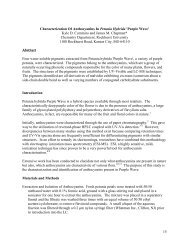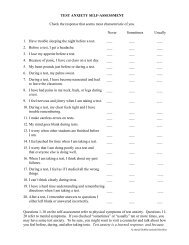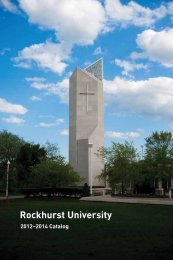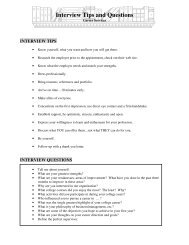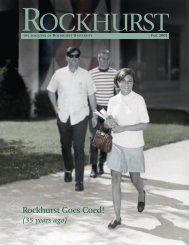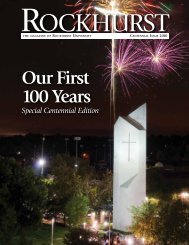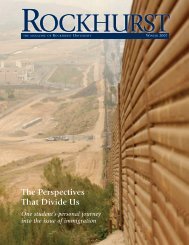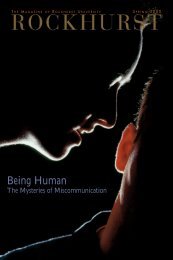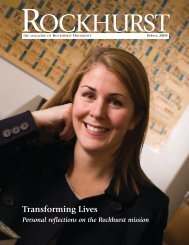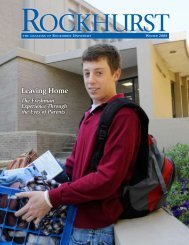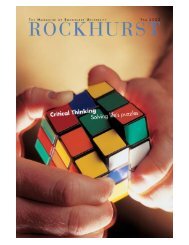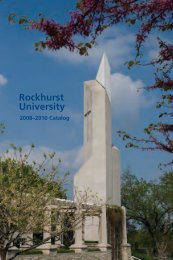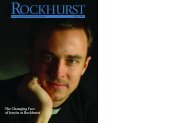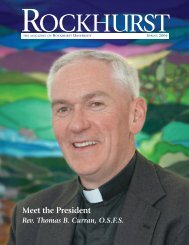Photo courtesy of Harry S. Truman Library & Museum.and what <strong>the</strong>y’ll put up with. Television haswoven itself <strong>in</strong>to <strong>the</strong> fabric of American life. Ithas affected, and, <strong>in</strong> some cases, fouled almostall aspects of American life. Across academicdiscipl<strong>in</strong>es, <strong>the</strong> study of presidential leadershipis one of those issues that television has altereddramatically. How has television forcedpresidents to lead <strong>in</strong> <strong>the</strong> era of <strong>the</strong> Fourth Estate?What is Leadership?The study of leadership has undergoneconsiderable transformation <strong>in</strong> <strong>the</strong> past 50 years.Early <strong>the</strong>ories suggested thatleaders were born, not made.Researchers conducted studiesto <strong>in</strong>dicate that leadershipcharacteristics came naturally tosome, but not to o<strong>the</strong>rs. Leaderswho were fit, had symmetricalfacial features, had strong voicesand who were attractive wereoften thought to make <strong>the</strong> bestleaders. Indeed, charisma, a traitlater acknowledged as perhaps<strong>the</strong> key attribute of leaders,became a fully developed <strong>the</strong>oryof leadership.Subsequent <strong>the</strong>ories ofleadership offered some hope tothose who may not have had strongphysical features or easily identifiableleadership traits. Style and situationalapproaches proposed that if one had ameans for gett<strong>in</strong>g a job done andcould <strong>in</strong>fluence people <strong>in</strong> positiveways, <strong>the</strong>n one could lead. Stillo<strong>the</strong>r <strong>the</strong>ories proclaimed leadersmust have a vision and <strong>the</strong> skill andmeans to articulate that vision too<strong>the</strong>rs. Regardless of <strong>the</strong> <strong>the</strong>oreticalperspective, few considered television,or o<strong>the</strong>r media, a variable ofleadership. Now, television has<strong>in</strong>troduced enough static to distortleadership on a fundamental level.Creat<strong>in</strong>g <strong>the</strong> ImagePresidents and <strong>the</strong>ir communication staffs(that is, speechwriters and image-producers)have grown more television savvy over <strong>the</strong> years.In <strong>the</strong> years prior to <strong>the</strong> television explosion,Roosevelt and Truman advisers scoffed at <strong>the</strong>idea that <strong>the</strong>y had a role <strong>in</strong> shap<strong>in</strong>g <strong>the</strong> image ofpresidential leadership. Clark Clifford, a closeTruman adviser and speechwriter, said that be<strong>in</strong>gPhoto by Burton Ber<strong>in</strong>sky, courtesy of John Fitzgerald Kennedy Library.ROCKHURST 18
identified publicly with <strong>the</strong> title of speechwriterwould be <strong>in</strong>appropriate — Truman’s own styleand his policies should speak for <strong>the</strong>mselves.Clifford was Truman’s “Legal Counsel.” In thosedays, s<strong>in</strong>ce speeches were scarcely televised, closeadvisers grappled with issues such as whe<strong>the</strong>r aState of <strong>the</strong> Union Address should be presentedorally or written and hand-delivered toCongress, an option still available to <strong>the</strong>president. In <strong>the</strong> current era of television, sucha choice is a laughable issue.In <strong>the</strong> middle 20th century, few presidentsdealt <strong>in</strong> any way with television media. Truman’s1949 <strong>in</strong>augural was <strong>the</strong> first televised and <strong>the</strong>medium, arguably, didn’t really reveal itself as amajor force until 1960. Some scholars argue that<strong>the</strong> famous Kennedy/Nixon debate of 1960 was<strong>the</strong> beg<strong>in</strong>n<strong>in</strong>g of a more complete understand<strong>in</strong>gof <strong>the</strong> power of television. Nixon, who wasrecover<strong>in</strong>g from an illness, appeared somewhatpale and unshaven. He apparently could notcompete well <strong>in</strong> a debate with Kennedy, wholooked sharp and is reported to have usedmakeup. Radio listeners, however, considered<strong>the</strong> outcome of <strong>the</strong> debate a draw at a m<strong>in</strong>imumand probably favor<strong>in</strong>g Nixon if ei<strong>the</strong>r. Thedebate does <strong>in</strong>dicate that viewers <strong>in</strong>deed weredrawn to physical traits of leaders highlightedby television.In some cases, experts go beyondhighlight<strong>in</strong>g traits to actually creat<strong>in</strong>g <strong>the</strong>m. In1988, 5-foot-8 <strong>in</strong>ch Michael Dukakis strolledout for one of his presidential debates withGeorge Bush and stepped up to a lectern thatwas some seven <strong>in</strong>ches shorter than <strong>the</strong> muchtaller Bush’s. Also, to create an image of leadershipequal to Bush’s, Dukakis’ communicationteam arranged for him to stand on a platformthat raised him even higher. Surely, his advisersmust have thought, we cannot afford toallow television to punish us for a dim<strong>in</strong>utivecandidate.Ironically, <strong>the</strong> necessity of leaders to dealwith <strong>the</strong> media, often result<strong>in</strong>g <strong>in</strong> simpleunwill<strong>in</strong>gness or failure for lack of skill, onlyfeeds <strong>the</strong> media’s desire to identify leaders aslack<strong>in</strong>g leadership. That is, presidents may behandicapped by <strong>the</strong> same medium <strong>the</strong>y reject assuperfluous to leadership. Jimmy Carter oncesaid, after leav<strong>in</strong>g office, that <strong>the</strong>re was nogreater “pa<strong>in</strong> <strong>in</strong> <strong>the</strong> neck” for him than hav<strong>in</strong>gto deal with his speechwriters and, implicitly,o<strong>the</strong>r communication staff. His <strong>in</strong>terest <strong>in</strong>craft<strong>in</strong>g a message that television favored wasalways secondary to its content. Unfortunately,his television performances and his messagesrarely were received positively — Carter hadvirtually <strong>the</strong> lowest public approval rat<strong>in</strong>gs ofany president <strong>in</strong> <strong>the</strong> last 70 years.Good Times, Bad TimesGood leadership usually demands clarity ofvision — both <strong>in</strong> <strong>the</strong>ory and as it is expressed tofollowers. Visionary leadership is corrupted bytelevision, however, as it encourages vaguenessby reduc<strong>in</strong>g position statements to sound bites.Some sound bites are constructed strategicallyto allow a president to take several positionsat once to, thus, appeal to many audiences.Consider <strong>the</strong> phrases “take to a new level,”“move <strong>in</strong> a new direction” or “enact legislationthat benefits all Americans” to endorse a policy.Or <strong>the</strong> ubiquitous “paradigm shift” that we allmust make. O<strong>the</strong>r more specific bites, pennedby speechwriters, reduce vision to memorablequips, such as Reagan’s Panama Canal summary“we built it, we paid for it, it’s ours,” GeorgeBush’s “no new taxes,” Cl<strong>in</strong>ton’s “bridge to <strong>the</strong>21st century,” while candidates spontaneouslyPhoto courtesy of George Bush Presidential Library.19 FALL 2001



